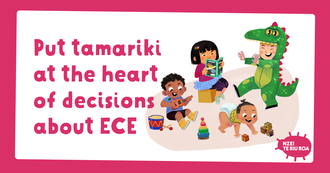-
Opposition to gutting the independence and core functions of the Teaching CouncilOpposition to gutting the independence and core functions of the Teaching Council From: NZEI Te Riu Roa, PPTA Te Wehengarua, New Zealand Principals’ Federation, Aotearoa Educators Collective, Teacher Education Forum of Aotearoa New Zealand, He Whānau Manaaki Kindergartens, Catholic Education Office, Montessori Aotearoa New Zealand, New Zealand Pasifika Principals’ Association As peak bodies in the education sector representing tens of thousands of teachers working in schooling and ECE, we strongly oppose your decision this week to gut the independence of the Teaching Council and remove its core standard-setting functions. Our first and most fundamental ethical and professional obligation is to our ākonga, past, current and future. Our standards and codes have been developed and set, for and by the profession, under the oversight of an independent Teaching Council. That independence is critical because standards must reflect widely and deeply held aspirations and the expectations society and teachers themselves place on the profession both for today and for the long-term. Your announcement claims to strengthen initial teacher education (ITE) and workforce governance, but the actual changes represent a fundamental shift in professional autonomy and independence. Late last year, you consulted with our organisations about a “lift and shift” of Teaching Council responsibilities for initial teacher education. We said we wanted ITE strengthened, with more investment and greater sector input, but that the Teaching Council was the appropriate body to have oversight of our profession’s entry and training requirements. We said that direct political control of professional programmes and standards by Ministers through the Ministry would be an over-reach and was tantamount to political interference. We said moving oversight and approval of initial teacher education programmes to the Ministry of Education would remove it from oversight by an independent statutory body governed by a council jointly elected by teachers and appointed by the Minister – and would therefore reduce, partially or wholly, both the professional independence and voice of teachers in terms of who determines teacher education standards. We said no evidence has been provided by the Ministry about how it could improve initial teacher education, and it has neither the capability, capacity nor confidence of the profession to take on this role. You listened to our feedback and instead decided to appoint the Secretary of Education as an advisor to the Council. Now, without any evaluation of the effectiveness of that decision, any credible evidence or research to back up your assertions, any outcomes from the investigations you have commissioned into the Council’s operations, and without any consultation with the 100,000+ teachers and teacher educators whose fees have paid for the Council over decades, you have abruptly announced changes to legislation silencing our voices. Under your changes, the Ministry will assume responsibility for all professional standard-setting functions, including standards for teacher education programmes, Teaching Standards, criteria for registration and certification, and setting the code of conduct. The Teaching Council will retain only registration, quality assurance, and discipline functions. Our critical concerns are: 1. Loss of professional and democratic voice The proposed legislation undermines teachers’ professional autonomy and self-regulation of our own profession. It communicates a distrust of the teaching profession and risks undermining the reputation of teachers in the public eyes. Teacher voice is being diminished. The teacher educator-elected representative on the Council’s governing body is being removed immediately and replaced by a Ministerial appointment. Instead of 7 elected members of a 13-member council, there will be only three elected members, with the remining members of a smaller council Ministerially appointed. The Teaching Council's legislative responsibility to provide direction for teachers, enhance the status of the profession, promote best practice, and foster development of the profession will be removed. This affects every teacher, not just those in initial teacher education. 2. Independent professional body oversight of teaching standards replaced by direct political control It is unclear how the Teaching Council will continue to be the independent professional body for teachers when its only remaining functions are registration and disciplinary functions. When the Ministry writes both the professional standards AND the teachers’ code of conduct, our ability to speak out professionally in the interests of ākonga and quality teaching and learning becomes subject to direct political control. This is unprecedented. 3. Te Tiriti obligations at risk Current Teaching Council standards explicitly require teachers to honour Te Tiriti o Waitangi, design culturally responsive learning, and understand the unique status of tangata whenua. By transferring standard-setting to the Ministry, the Government creates a mechanism to re-write these requirements in line with their stated policy of downgrading Te Tiriti in education. Fundamentally, your decisions mean principals, education leaders and teachers will lose the ability to have a say in the standards that we must follow. The Teaching Council has been set up as an independent entity so that our professional codes and standards are developed and owned by the teaching profession itself. They should not be subject to the political whims of any particular government. Moving the teaching code and standards to the Ministry puts the independence of the teaching profession and initial teacher education providers, and ultimately the quality of teaching and learning for our ākonga, at risk.59 of 100 SignaturesCreated by NZEI Te Riu Roa
-
Back education that works for all tamarikiAll tamariki deserve an education where they can learn, feel included and access learning support when they need it. However, the Government is taking public education in the wrong direction and tamariki are being left behind. Schools, kindergartens, and early childhood centres have faced cuts to school lunches, te reo Māori programmes, beginning teacher pay, and literacy and te reo jobs. Some schools have to fundraise to help pay for teacher aides, whose support in the classroom is invaluable for all students. Many tamariki sit on learning support waitlists for months due to inadequate learning support staffing. Attacks on quality early childhood education and scrapping of pay equity claims for our lowest paid in education make it clear the Government does not value the work of education professionals nor our children’s learning. Primary and early childhood education teachers, learning support workers, principals and support staff, kohanga reo, wharekura and whānau are coming together to seek a new dawn in education. Join us in demanding better for our tamariki! Kimi Haeata. Back Our Future! Nā te aha e pātai pēnei ai: Kei te tamaiti te anamata o te mātauranga ki te ako, tautokohia. Kua hē te haere ā te Kāwanatanga nei, ko ngā mokopuna te utu. Kua poroa te pūtea tunu kai, ngā hōtaka Māori, oti rā ngā utu o te kaiwhakaako hou, kaiwhakaako reo matatini , reo Māori anō hoki ki ngā kura. Ka riro mā te kura te pūtea e whakaemiemi kia āhei te kaiāwhina tautoko me ōna rawa ki te tauawhi tamariki. Nā te kore kaimahi umanga mātauranga, tokomaha ngā tamariki e tatari tonu ana. E kore te Kāwanatanga e mārama ana ki te wāriu o te tangata e matatau ana ki te mātauranga , heoi oti ki te ao ako o te tamaiti, ka puta ko ēnei whakawhiu, ka tauria te whare kōhungahunga, i whakakorehia ngā kerēme mana taurite mō te hunga rawakore. Ko te huihuinga ā te whānau me te ao mātauranga ā Te Riu Roa e haere ake nei, ki te rapu i te haeata e kimi nei tātou. Nau mai haere mai, whakapiri mai, ko ngā tamariki te take. Kimi Haeata!34,200 of 70,000 SignaturesCreated by NZEI Te Riu Roa
-
Back quality early childhood education for all tamariki!Our youngest learners deserve the best. Children’s early years are the most important – for their learning and wellbeing, and outcomes for the rest of their lives. The research backs this up: the benefits of public investment in high-quality early childhood education far outweigh the costs. Yet, right now, the Government is making changes to scrap pay parity for teachers, undermine qualified teacher requirements, scrap curriculum standards that ensure quality teaching, remove requirements to honour Te Tiriti o Waitangi, remove important safety regulations for tamariki, and more. It’s teachers' qualifications, professionalism, and expertise that make the difference for tamariki. But teachers can only do their best when they’re respected, valued, and supported with teacher-to-child ratios and conditions which create quality learning. The Government has already scrapped early childhood teachers’ pay equity claim and removed pay parity for all new, relieving, and fixed-term teachers, and said it will scrap pay parity for early childhood teachers, all so greater profit can be made from children’s education. We are now at a critical point where the changes that are being pushed through will have serious long-term impacts on tamariki, whānau, and early childhood kaiako. Early education has a huge effect on children's life outcomes. Right now, the Government is progressively removing important regulations and teachers' rights that ensure quality early childhood education for tamariki. Signatories: Child Poverty Action Group Dr Linda Mitchell – professor and early childhood education academic Early Childhood Academic Special Interest Group – a group of expert ECE academics across Aotearoa Education International – global union for 33 million teachers and education workers TIASA (Tertiary Institutes Allied Staff Association Te Hononga) NZCTU – Te Kauae Kaimahi Child’s Rights Alliance (CRAANZ) Unite Union Equity New Zealand E tū NZNO Tōpūtanga Tapahi Kaitiaki o Aotearoa Workers First Union PSA Te Pūkenga Here Tikanga Mahi He Whānau Manaaki Childspace11,267 of 15,000 SignaturesCreated by NZEI Te Riu Roa
-
Put tamariki at the heart of decisions about ECEThe quality of ECE will decrease, qualified teachers will be undermined, children will be less safe, most of the ECE curriculum will not be compulsory, and profits for business would increase rather than seeing tamariki and their needs at the heart of decisions about the future of early childhood education.11,722 of 15,000 SignaturesCreated by Amy
-
Support investing in essential school staffBy signing your name to the open letter, you are showing support for these workers as an essential resource for ākonga and schools, and for a quality public education in Aotearoa, New Zealand.22,790 of 25,000 SignaturesCreated by NZEI Te Riu Roa
-
Raise your voice for tamariki nowRegulations set the parameters for the day-to-day work of ECE kaiako and kaimahi and the learning and safety conditions for tamariki. It’s not just about paperwork! Everything – from the physical space centres occupy, to the safety of tamariki, and the pay rates kaiako receive – is determined by regulations.The risk of regulatory failure is huge in ECE, because it affects the safety and wellbeing of tamariki. The Ministry for Regulation intends to consider the rationale for the Government’s involvement in and regulation of the sector – that means the very purpose of ECE is under consideration with this review.58 of 100 SignaturesCreated by NZEI Te Riu Roa
-
Submit against the Government’s decision to repeal network approval for ECEWhy is this important? We do not agree with the Government’s decision to repeal the network approval provisions or the fast process they’ve used to do it. By submitting and having our voices heard, we are showing that we are the sector experts, and we need to be consulted. Removing network management takes away a process which ensured early education services being set up were appropriate for the community. To make it easier for you to participate in this process, we’ve set up a form for you to fill out with some suggested talking points below.28 of 100 SignaturesCreated by Sarah
-
All Tamariki and Rangatahi Deserve Qualified TeachersAll tamariki, regardless of which school they attend, deserve an education that is delivered by qualified and professionally accountable teachers. Your voice needs to be heard on this issue. NZEI Te Riu Roa members sign up to receive an action alert on making a submission on the charter schools legislation and an invitation to online submission workshops once the submission timeline has been announced. NZEI Te Riu Roa charter schools campaign PPTA Te Wehengarua charter schools campaign2,456 of 3,000 SignaturesCreated by Chris
-
Stand with early childhood teachers to save pay parityTeachers, parents, whānau and communities fought for two decades to win respect, recognition and pay parity for teachers in early childhood education. After finally achieving progress with pay parity, the National, ACT and NZ First coalition Government are initiating radical changes in early childhood education. They have signalled funding changes that threaten the pay of tens of thousands of teachers and risk children’s wellbeing by rolling back safety regulations. Removing protections to teacher pay and safety regulations are not new ideas. They are failed ideas that enable unscrupulous employers to cut corners. Ultimately, it is tamariki and staff who suffer when providers have a license to put profit before providing great care and education. We know that for tamariki to have the best start in life they need great foundations and the best possible beginning to their lifelong journey. Every child, no matter where they live or how much their parents earn, should have access to quality early childhood education, Māori medium, and Pacific language services that suit their needs and community, which place culture and identity at the heart. Kōhanga Reo, Puna Reo and early childhood teachers are trained and qualified to make sure our youngest children get the best teaching and learning – just like teachers in kindergartens and schools. Regardless of where our kaiako work, if they work to grow our tamariki and mokopuna they should have their mahi valued equally. Respect our youngest mokopuna in education, their kaiako, and their whānau. Don’t let Minister Seymour attack teacher conditions – the learning conditions for our mokopuna. Take us forwards, not backwards!9,034 of 10,000 SignaturesCreated by Sarah









